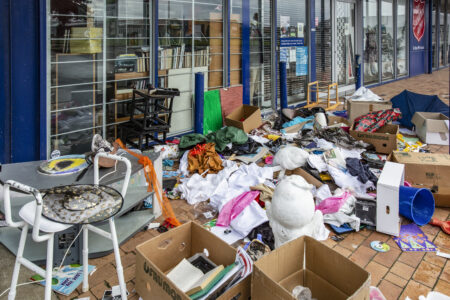
Some people are taking advantage of the latest Covid-19 lockdown to de-clutter their homes, but not in a way that’s productive or legal.
Large piles of what appears to be rubbish and decaying household items have been piling up outside the Salvation Army Family Store in Botany since the level four lockdown began on August 17.
The Times observed a sprawling pile of dumped items outside the Botany Road charity shop on August 20.
It included cardboard boxes, clothing and shoes, books, furniture, children’s toys, much of it looking dirty and stained.
At the side of the shop were more items, including a double bed mattress lying on the wet ground, more household furniture, what appeared to be a damaged TV cabinet, toilet paper, and an old and dirty glass bottle.
A sign in the store’s window that states: “Please do not leave donated goods outside of business hours. Thank you”, was either not seen or ignored by the people who created the mess.
The Salvation Army’s Louise Parry says the charity is seeing piles of donations being left outside some of its family stores since lockdown began.
“We appreciate people wanting to donate things they no longer need, but under level four our staff are not allowed to go into the shops and can’t clear donations left outside our family stores.
“These items end up getting rained on and blown around, and have to be sent to the tip, not something anyone wants.
“We ask people to hold off donating until we are open and then either drop off the items during our stores’ opening hours, or phone us to find out how they can get them to us.
“We are urging people to wait until they know we’re open again, and it’s the local council who ends up having to clean up these piles.”
Auckland Council waste solutions general manager Parul Sood says the council has not received a complaint about rubbish dumped at the charity shop in Botany Road, but during previous Covid-19 lockdowns it’s worked with the charity and other shops on the problem.
“It’s unacceptable at any time [to illegally dump rubbish] but particularly for charities when they’re unable to operate during level four,” Sood says.
“When the dumping is on private property, we’re able to provide advice on ways to prevent this occurring, such as installation of signs, fencing and cameras.
“We also work with stores to investigate illegal dumping that’s caught on camera and often issue fines to people leaving items outside charity shops.”
Sood says people caught illegally dumping rubbish, including leaving items outside a shop when it’s closed, face instant fines of $400 and, if successfully prosecuted, up to $30,000.
“If people are tempted to re-organise their garage right now, they’ll have to keep any unwanted items on their property until the services that can’t take them open again.
“When that happens, remember charity shops only want quality goods they can re-sell.
“If people give a charity shop things they cannot sell, they’re burdening them with the cost of getting rid of the rubbish.
“If items are potentially re-useable, they should be stored somewhere clean and dry.
“When the shops start opening, then re-useable items can be taken during opening hours only to see if they are accepted for sale.”










